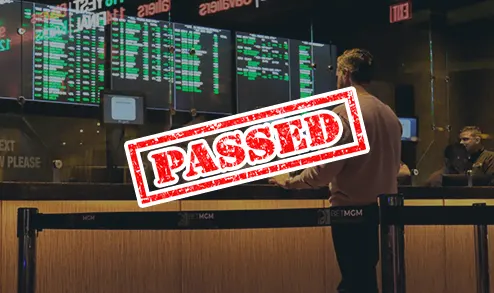 Vermont inches closer to legalized sports betting after the House approved the amended version of a sports betting bill Tuesday morning. The future of the legislation is now in the hands of Governor Phil Scott, who has five days to sign or veto the bill. If he does not act on the bill within the designated timeframe, the legislation would be considered approved. Up to six betting platforms would be authorized to operate in the Green Mountain State, starting January 1, 2024.
Vermont inches closer to legalized sports betting after the House approved the amended version of a sports betting bill Tuesday morning. The future of the legislation is now in the hands of Governor Phil Scott, who has five days to sign or veto the bill. If he does not act on the bill within the designated timeframe, the legislation would be considered approved. Up to six betting platforms would be authorized to operate in the Green Mountain State, starting January 1, 2024.
Sports Betting Bill Awaits Governor’s Signature
Vermont has all the chances to become the 38th state to legalize sports betting. On Tuesday morning, the House approved the Senate-amended version of House Bill 127, which seeks to regulate the industry and allow Vermonters to bet on their favorite sporting events without having to cross the borders of the state.
The legislative effort aims to curb illegal gambling activities and boost state coffers. According to the Joint Fiscal Office, the state would generate up to $2 in sports betting revenue in the 2024 fiscal year and $10.64 million in fiscal year 2025.
Vermont Rep. Matthew Birong (D-Addison 3), with six Democratic and three Republican co-sponsors, introduced House Bill 127 in late January. The legislation has received support from the Governor, who pledged to sign the bill once it appears on his desk. Experts claim that by legalizing the sports betting industry, Vermont will be able to establish better consumer protection practices and take adequate measures to cope with gambling-related problems.
What Do We Know about the Bill So Far?
The legislative effort would legalize sports betting, which would be under the supervision of the Department of Liquor and Lottery. If the bill becomes law, the regulator will select up to six operators through a competitive bidding process. A week ago, BonusInsider reported that the Senate approved the bill after amending it. And since the legislation was initially introduced in the House, it had to go back to that chamber for concurrence.
Under the amended version of the bill, operators will have to include an advertising plan in their license applications. Additionally, gambling commercials should not target individuals under the legal gambling age of 21. Licensed operators will have to pay at least 20% of their revenue. The bill also mandates an initial $550k licensing fee per operator, while the fee for renewing a license will be $110k. The money will go to a newly formed Sports Wagering Enterprise Fund.
The legislation also prohibits punters from using their credit cards to wager. This measure has been introduced to prevent bettors from playing with money they do not have. Operators would not be allowed to use words such as “risk-free” when promoting their bonuses. Licensees would be required to submit a responsible gaming plan to the regulator and the Department of Mental Health every year. If the bill becomes law, Vermonters will be able to place wagers on all sporting events other than in-state college tournaments. However, the legislation makes an exception for events such as March Madness.